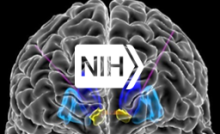
The BRAIN Initiative® remains in a unique position to lead cross-cutting and accelerated discovery in neuroscience across a diverse network of institutions and organizations, laboratories, researcher fields, and geographic locations.
The NIH BRAIN Initiative funded more than 195 new research projects in fiscal year 2022, totaling over $324 million. This past year’s portfolio includes the launch and progression of two of our three large-scale transformative projects—the BRAIN Initiative Cell Atlas Network (BICAN) and the Armamentarium for Precision Brain Cell Access. The BICAN projects will build upon recent successes in creating a comprehensive cell atlas of the mouse brain and comprise 11 awards whose primary goal will be to work together to map the larger brains of non-human primates and humans at high resolution. Other awards will develop new viral-based tools to access brain cell types across species that will be built into an “armamentarium” or toolkit. Scientists will be able to use the toolkit to access specific brain cells and neural circuits in model systems that include both laboratory animals and human tissue specimens.
As part of a broader endeavor to develop better, more precise treatments for neurologic and neuropsychiatric diseases, many projects will optimize current technologies and test new clinical approaches. These awards include efforts to modulate cerebellar activity by combining non-invasive stimulation methods; restore motor function after stroke with spinal cord stimulation; and treat cognitive decline in Parkinson’s disease by testing new deep brain stimulation approaches.
Other awards will continue to uncover new knowledge about the human brain and its circuits. These basic science studies are laying the groundwork for tools to map, observe, and modulate brain circuits with increasing precision, which will increase our knowledge of how the brain works, reveal what goes wrong in brain disorders, and pave the way for new therapeutics.
There are also several grants that will support integrated research on neuroethical implications of BRAIN-funded projects, including developing toolkits to help foster partnerships between academia and industry, and establishing inclusive ethical frameworks for brain-computer interface research.
With these awards, researchers will develop innovative approaches to study the neural circuit basis of cognition and behavior. Many of these projects focus on developing unique model systems. For instance, one will use electrophysiology in wasps to study facial recognition and other social behaviors, and another will use whole-brain calcium imaging in zebrafish to elucidate sleep circuits. This year, several awards will continue to develop data archives and widely disseminate tools and reagents to the neuroscience community.
The NIH BRAIN Initiative continues to take a concerted approach to fostering scientific excellence through investments in tools, training, data resources, and increasing diversity and inclusivity in the research community. This includes focused funding opportunities for diverse trainees across career stages and capacity building at under-resourced institutions. In addition, the NIH BRAIN Initiative has implemented the Plan for Enhancing Diverse Perspectives (PEDP), a grant application requirement that encourages the research community to broadly consider how diverse perspectives advance their proposed specific aims. Though the PEDP was initially started as a pilot by the Initiative, it has been adopted by many Institutes and Centers across the NIH.
Overall, these projects and many others funded in 2022 represent progress toward several goals of the BRAIN Initiative; but more than reaching goals, BRAIN is laying the foundation for understanding how the healthy brain works to accelerate discoveries for treatments and cures for those living with brain disorders.
In gratitude,
John Ngai, Ph.D.
